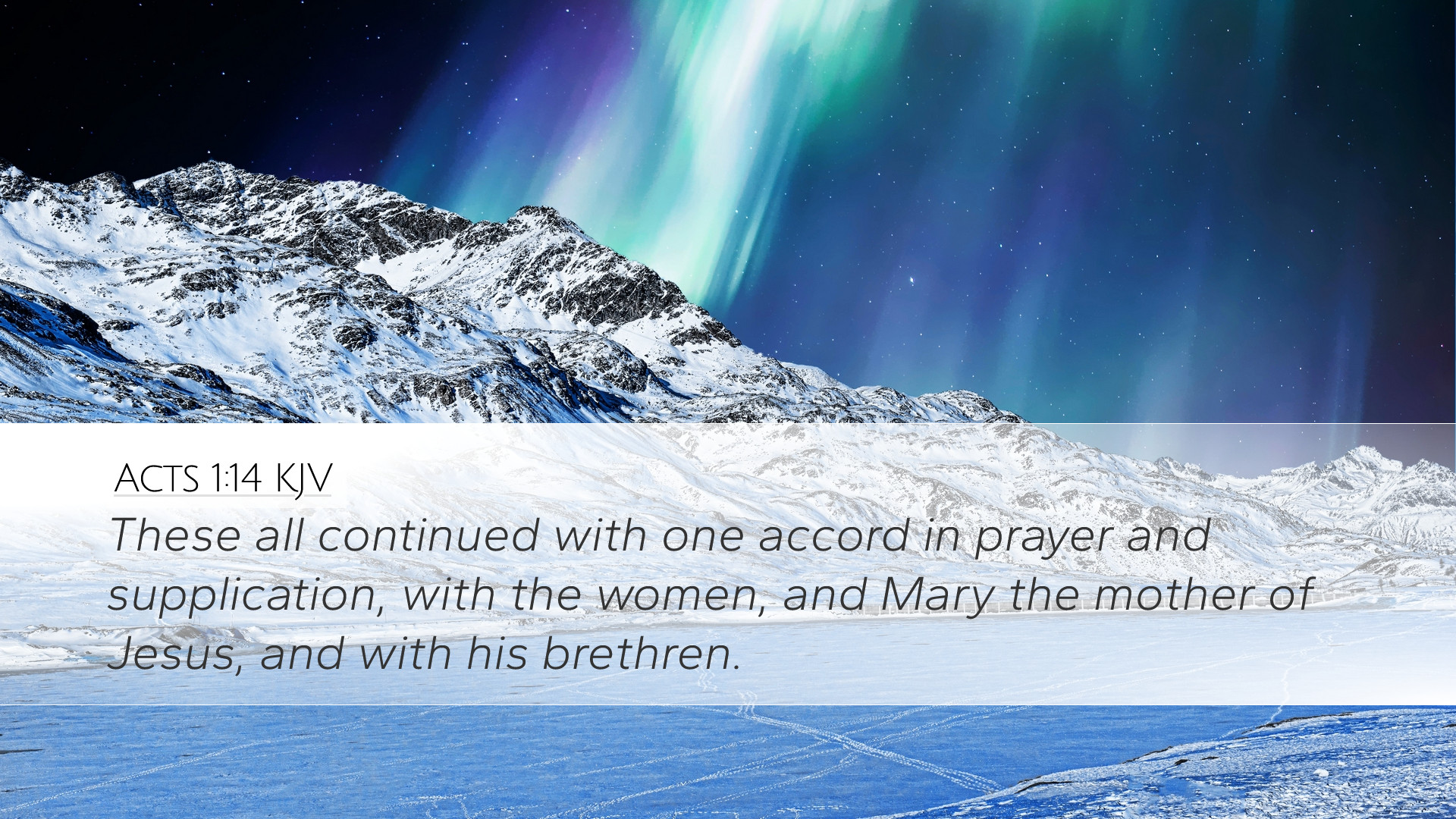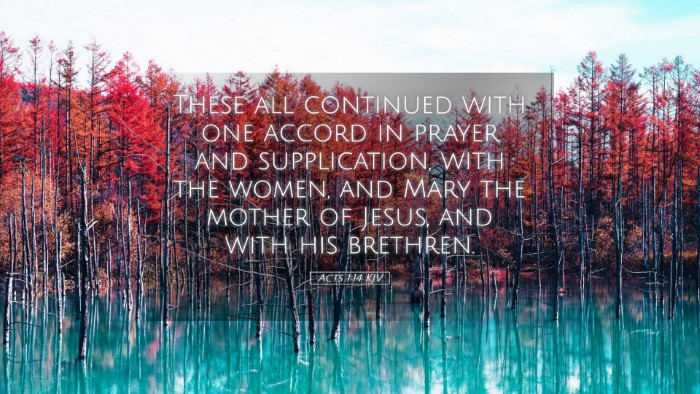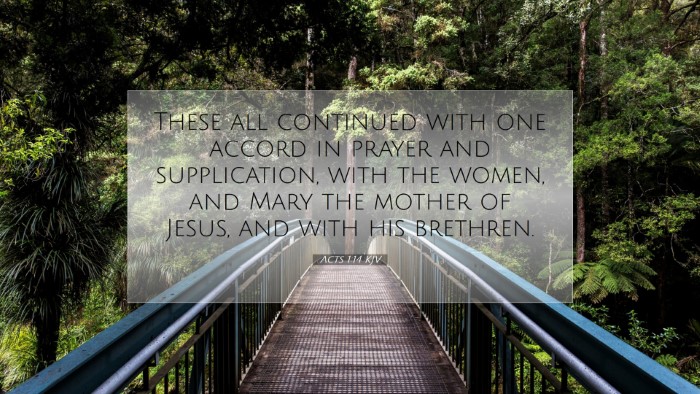Old Testament
Genesis Exodus Leviticus Numbers Deuteronomy Joshua Judges Ruth 1 Samuel 2 Samuel 1 Kings 2 Kings 1 Chronicles 2 Chronicles Ezra Nehemiah Esther Job Psalms Proverbs Ecclesiastes Song of Solomon Isaiah Jeremiah Lamentations Ezekiel Daniel Hosea Joel Amos Obadiah Jonah Micah Nahum Habakkuk Zephaniah Haggai Zechariah MalachiActs 1:14
Acts 1:14 KJV
These all continued with one accord in prayer and supplication, with the women, and Mary the mother of Jesus, and with his brethren.
Acts 1:14 Bible Commentary
Commentary on Acts 1:14
Scripture: "These all continued with one accord in prayer and supplication, with the women, and Mary the mother of Jesus, and with his brethren." (Acts 1:14, KJV)
Introduction
Acts 1:14 serves as a pivotal verse in the early narrative of the Christian Church following the ascension of Jesus Christ. This verse encapsulates the unity, fervor, and purpose of the believers as they awaited the promised Holy Spirit. Through insights drawn from public domain commentaries, we explore the implications and significance of this passage for pastors, students, theologians, and Bible scholars.
The Context of Acts 1:14
This verse is set in a transitional period following the resurrection and ascension of Jesus. The apostles and disciples are commanded to wait in Jerusalem for the Holy Spirit, as indicated in Acts 1:4. The mention of “one accord” reflects a profound sense of unity among the early followers of Christ.
Insights from Commentaries
Matthew Henry provides profound observations on the term "one accord," highlighting that this was not merely physical agreement but spiritual unity. He reveals that such harmony was a foundational characteristic of the early church, which magnified their supplications and their dedication to prayer.
Albert Barnes expands upon the act of prayer and supplication mentioned in the verse. He emphasizes that prayer is not just a duty but a necessity for the believers as they sought divine guidance and empowerment. The collective nature of their prayer indicates the importance of community in the faith journey.
Adam Clarke points out the presence of women, including Mary, the mother of Jesus, which signifies the inclusivity within the early church. This aspect suggests a radical departure from contemporary societal norms, emphasizing that the empowerment of the Holy Spirit is accessible to all, regardless of gender.
The Role of Prayer in the Early Church
The unified prayer life of the early church is a major theme in Acts 1:14. This verse teaches modern believers about the importance of persistent prayer. As Matthew Henry explains, their prayer was marked by steadfastness and earnestness, a characteristic necessary for overcoming the trials they would soon face.
- Corporate Prayer: The communal aspect of prayer discussed by Albert Barnes encourages believers today to engage in corporate prayer, recognizing that collective prayers can be more potent as they unify the body of Christ.
- Expectation of the Holy Spirit: The fervency of their prayer illustrates a profound anticipation for the fulfillment of the promise of the Holy Spirit which aligns with Adam Clarke's insights into the role of women and others seeking empowerment.
Theological Implications
This passage has significant theological implications regarding the nature of the church and its mission. The believers' waiting period was not passive; it was a time of preparation through prayer, as emphasized by Matthew Henry. Their active anticipation demonstrates a core belief that prayer is integral to understanding and fulfilling God's will.
Unity in Diversity
The inclusion of women and the family of Jesus demonstrates the formation of a new community that breaks cultural barriers. Adam Clarke notes that such inclusivity foreshadows the great commission where the Gospel is to be preached to all nations, thus establishing a holistic view of God's church where every member plays a role.
Practical Application for Today's Believers
Acts 1:14 serves as a template for how contemporary believers might approach their faith communities. The insights from the aforementioned commentaries encourage several practical applications:
- Engaging in Intentional Prayer: Churches should cultivate a culture that prioritizes prayer, reflecting the commitment seen in the early church.
- Promoting Unity: Believers are called to foster unity within the body of Christ, setting aside differences to pursue a common goal in Christ.
- Empowering All Believers: Recognizing that every member, regardless of gender or background, has a crucial role enhances the mission of the church.
Conclusion
Acts 1:14 is more than a historical account; it is a call to the church today. The insights drawn from the commentaries of Matthew Henry, Albert Barnes, and Adam Clarke provide a rich, multi-faceted understanding of the verse's significance. As the church continues to navigate an ever-changing world, the principles of unity, prayer, and empowerment remain eternally relevant and necessary for the advancement of the Gospel.


